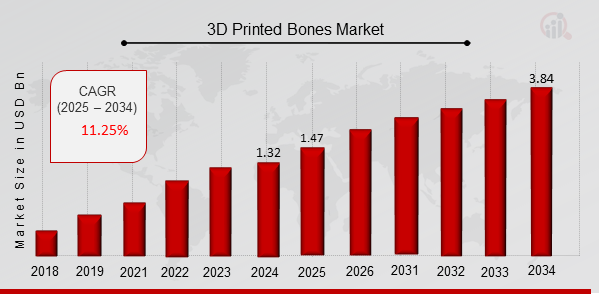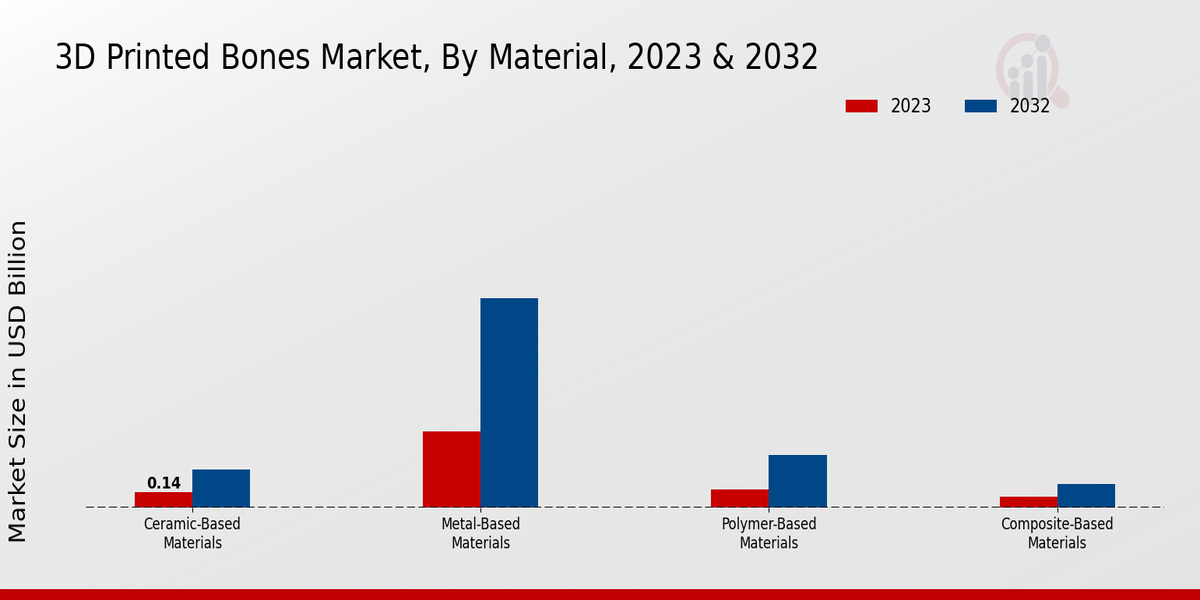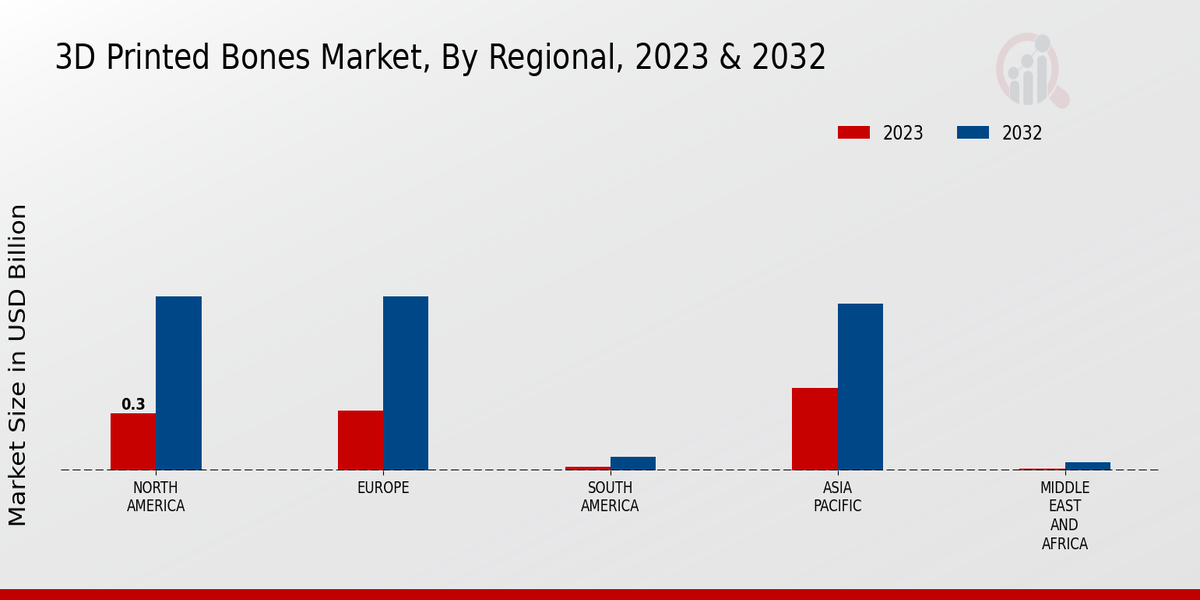3D Printed Bones Market Overview
As per MRFR analysis, the 3D Printed Bones Market Size was estimated at 1.32 (USD Billion) in 2024. The 3D Printed Bones Market Industry is expected to grow from 1.47 (USD Billion) in 2025 to 3.84 (USD Billion) till 2034, at a CAGR (growth rate) is expected to be around 11.25% during the forecast period (2025 - 2034).
Key 3D Printed Bones Market Trends Highlighted
The global 3D printed bones market is witnessing a surge in demand due to advancements in medical technology and the rising prevalence of bone injuries and diseases. The increased adoption of 3D printing in healthcare is enabling the creation of patient-specific implants and scaffolds that provide optimal fit and functionality.
Key market drivers include the growing demand for personalized medical treatments, the need for cost-effective and efficient bone repair solutions, and government initiatives supporting the development of novel biomaterials. The market is also fueled by the increasing incidence of osteoporosis and other bone disorders, along with the growing awareness of 3D printing technology among healthcare professionals.
Market opportunities lie in the development of bio-resorbable materials for temporary implants, the integration of sensors and drug delivery systems into printed bones, and the use of 3D printing in reconstructive surgery. Recent trends include the emergence of AI-powered design tools for personalized implants, the development of multi-material printing techniques for complex bone structures, and the exploration of stem cell printing for bone regeneration.

Source: Primary Research, Secondary Research, MRFR Database and Analyst Review
3D Printed Bones Market Drivers
Growing Demand for Personalized and Patient-Specific Treatments
The increasing demand for personalized and patient-specific treatments is a major driver of the Global 3D Printed Bones Market Industry. 3D printing technology enables the creation of customized implants and bone structures that are tailored to the unique anatomy of each patient. This level of personalization leads to improved surgical outcomes, reduced recovery times, and enhanced patient satisfaction. As the demand for personalized healthcare solutions continues to grow, the adoption of 3D-printed bones is expected to accelerate, driving market growth.
Technological Advancements in 3D Printing
Advancements in 3D printing technology are another key driver of market growth. The development of new materials, improved printing techniques, and enhanced software capabilities have expanded the range of applications for 3D-printed bones. For instance, the introduction of biocompatible materials that promote bone growth has enabled the creation of more complex and functional implants. These advancements contribute to the increased precision, efficiency, and affordability of 3D-printed bone solutions, making them more accessible and attractive to healthcare providers and patients.
Rising Prevalence of Bone-Related Conditions
The rising prevalence of bone-related conditions, such as osteoporosis, osteoarthritis, and bone fractures, is a significant factor driving the growth of the Global 3D Printed Bones Market Industry. The aging population and the increasing incidence of chronic diseases have contributed to the growing demand for bone repair and replacement procedures. 3D-printed bones offer a promising solution for addressing these conditions, as they can be customized to meet the specific needs of each patient and provide improved outcomes.
3D Printed Bones Market Segment Insights:
3D Printed Bones Market Material Insights
The Global 3D Printed Bones Market is segmented by Material into Ceramic-based materials, Metal-based materials, Polymer-based materials, and Composite-based materials. Among these, the Metal-based materials segment held the largest market share in 2023 and is expected to continue dominating the market throughout the forecast period. This dominance can be attributed to the superior mechanical properties and biocompatibility of metal-based materials, making them ideal for load-bearing applications in bone repair and replacement. The Polymer-based materials segment is anticipated to experience the fastest growth over the forecast period due to the increasing adoption of 3D printing technology in the medical field and the development of new biocompatible and biodegradable polymers.The Ceramic-based materials segment accounted for a significant share of the Global 3D Printed Bones Market revenue in 2023 and is projected to maintain a steady growth rate during the forecast period. Ceramic-based materials offer excellent biocompatibility and osteoconductivity, making them suitable for bone regeneration and repair applications. The Composite-based materials segment is expected to gain traction in the coming years as researchers explore new composite materials with tailored properties for 3D-printed bone implants and scaffolds.The Global 3D Printed Bones Market is driven by factors such as the rising prevalence of bone-related disorders, increasing demand for personalized and minimally invasive surgical procedures, and advancements in 3D printing technology. The market is also supported by government initiatives and funding for research and development in the field of 3D-printed bone implants and scaffolds. However, the high cost of 3D printing equipment and materials, as well as regulatory challenges, pose potential barriers to market growth.

Source: Primary Research, Secondary Research, MRFR Database and Analyst Review
3D Printed Bones Market Bone Type Insights
The Global 3D Printed Bones Market segmentation by Bone Type comprises Craniofacial bones, Spine bones, Upper limb bones, and Lower limb bones. Among these, the Craniofacial Bones segment held the largest Global 3D Printed Bones Market share in 2023 and is expected to continue its dominance throughout the forecast period. The growth of this segment can be attributed to the increasing prevalence of craniofacial disorders and the rising demand for customized cranial implants. The Spine bones segment is expected to witness the fastest growth during the forecast period, owing to the rising number of spinal surgeries and the growing adoption of 3D-printed spinal implants.The Upper limb bones segment is also expected to grow significantly, driven by the increasing demand for 3D-printed upper limb prosthetics and implants. The Lower limb bones segment is expected to grow steadily, driven by the rising demand for 3D-printed lower limb prosthetics and implants.
3D Printed Bones Market Application Insights
The application segment plays a crucial role in shaping the dynamics of the Global 3D Printed Bones Market. Cranioplasty, spinal fusion, trauma repair, joint replacement, and dental implants are key application areas, each contributing significantly to market growth. Cranioplasty, used in reconstructive skull surgeries, is expected to dominate the market with a substantial revenue share over the forecast period. Spinal fusion, a surgical technique for treating spinal disorders, is also projected to witness significant growth. Trauma repair, utilizing 3D-printed implants for bone regeneration, is gaining traction due to its effectiveness in treating complex bone injuries.Joint replacement, involving the replacement of damaged joints with 3D-printed prosthetics, is another major application driving market expansion. Dental implants, leveraging 3D printing for creating customized dental prosthetics, are also contributing to the overall market growth.
3D Printed Bones Market Technology Insights
Fused deposition modeling (FDM), Stereolithography (SLA), Selective laser melting (SLM), and Electron beam melting (EBM) are the key technologies used in the 3D printing of bones. FDM is widely adopted due to its low cost and ease of use. SLA offers high accuracy and resolution, making it suitable for complex geometries. SLM and EBM are used for producing metal implants with intricate designs and mechanical properties close to natural bone. The Global 3D Printed Bones Market segmentation by technology provides insights into the market growth, revenue generation, and industry trends.Market data indicates that FDM technology held a significant share in 2023 and is projected to maintain its dominance throughout the forecast period. SLA technology is expected to witness steady growth due to its precision and surface finish capabilities. SLM and EBM technologies are gaining traction in the market owing to their ability to produce high-strength and biocompatible bone implants.
3D Printed Bones Market End-use Setting Insights
The end-use setting segment of the Global 3D Printed Bones Market is expected to grow significantly in the coming years. Hospitals are expected to dominate the market, with a revenue of USD 0.75 billion in 2024. Orthopedic clinics are expected to be the second largest segment, with a revenue of USD 0.25 billion in 2024. Research institutions and dental clinics are also expected to contribute to the market growth. The market growth is attributed to the increasing demand for personalized and customized implants, as well as the growing adoption of 3D printing technology in the healthcare industry.
3D Printed Bones Market Regional Insights
The geographical analysis of the Global 3D Printed Bones Market showcases distinct regional market dynamics. North America leads the market with a significant market share, driven by advanced healthcare infrastructure, high adoption of innovative technologies, and increasing demand for personalized medical treatments. Europe follows closely, with a substantial market share attributed to government initiatives supporting the adoption of 3D printing in healthcare and a growing geriatric population. The APAC region exhibits promising growth potential, owing to rising healthcare expenditure, increasing awareness about 3D-printed implants, and expanding medical tourism.South America and MEA represent emerging markets with untapped growth opportunities, supported by government investments in healthcare infrastructure and growing demand for affordable healthcare solutions.

Source: Primary Research, Secondary Research, MRFR Database and Analyst Review
3D Printed Bones Market Key Players And Competitive Insights:
Major players in the 3D Printed Bones Market industry are constantly striving to gain a competitive edge in the market. Leading 3D Printed Bones Market players are investing heavily in research and development to develop innovative products and solutions that cater to the evolving needs of customers. The 3D Printed Bones Market is highly competitive, with a number of key players vying for market share. Some of the major players in the 3D Printed Bones Market include Stryker, Zimmer Biomet, and Materialise. These companies are constantly innovating and developing new products and technologies to stay ahead of the competition. The 3D Printed Bones Market is also seeing a number of new entrants, which is further intensifying the competition.One of the leading companies in the 3D Printed Bones Market is Stryker. Stryker is a global leader in the development and manufacture of medical devices, including 3D-printed bones. The company has a strong track record of innovation and has been at the forefront of the 3D printing revolution. Stryker's 3D-printed bones are used in a variety of applications, including orthopedic surgery, dental surgery, and maxillofacial surgery. The company has a wide distribution network, and its products are available in over 100 countries. Stryker is committed to providing high-quality products and services to its customers and is constantly investing in research and development to improve its offerings.A key competitor in the 3D Printed Bones Market is Zimmer Biomet. Zimmer Biomet is a global leader in the design, development, manufacture, and distribution of medical devices, including 3D-printed bones. The company has a long history of innovation and has been a pioneer in the development of 3D printing technology for medical applications. Zimmer Biomet's 3D-printed bones are used in a variety of applications, including orthopedic surgery, dental surgery, and maxillofacial surgery. The company has a wide distribution network, and its products are available in over 100 countries. Zimmer Biomet is committed to providing high-quality products and services to its customers and is constantly investing in research and development to improve its offerings.
Key Companies in the 3D Printed Bones Market Include:
- Materialise
- Renishaw
- SLM Solutions Group
- 3D Systems
- Exactech
- EnvisionTEC
- Voxeljet AG
- Stryker
- Zimmer Biomet Holdings
- Concept Laser GmbH
- Formlabs
- Arcam AB
- EOS GmbH
- Arcam EBM AB
3D Printed Bones Market Industry Developments
The global 3D printed bones market is projected to grow significantly over the next decade, driven by the increasing prevalence of bone defects and the rising demand for personalized medical treatments. In 2023, the market is valued at approximately USD 1.07 billion and is anticipated to reach USD 2.8 billion by 2032, exhibiting a CAGR of 11.25%. Technological advancements, such as the introduction of bioprinting techniques, have further fueled market growth. Recent news developments include the collaboration between Stryker and 3D Systems to develop 3D-printed titanium spinal implants and the acquisition of Oxford Performance Materials by Evonik Industries, expanding the latter's portfolio of 3D printing materials for medical applications.
3D Printed Bones Market Segmentation Insights
- 3D Printed Bones Market Material Outlook
- Ceramic-based materials
- Metal-based materials
- Polymer-based materials
- Composite-based materials
- 3D Printed Bones Market Bone Type Outlook
- Craniofacial bones
- Spine bones
- Upper limb bones
- Lower limb bones
- 3D Printed Bones Market Application Outlook
- Cranioplasty
- Spinal fusion
- Trauma repair
- Joint replacement
- Dental implants
- 3D Printed Bones Market Technology Outlook
- Fused deposition modeling (FDM)
- Stereolithography (SLA)
- Selective laser melting (SLM)
- Electron beam melting (EBM)
- 3D Printed Bones Market End-use Setting Outlook
- Hospitals
- Orthopedic clinics
- Research institutions
- Dental clinics
- 3D Printed Bones Market Regional Outlook
- North America
- Europe
- South America
- Asia Pacific
- Middle East and Africa
| Report Attribute/Metric |
Details |
|
Market Size 2024
|
1.32 (USD Billion)
|
|
Market Size 2025
|
1.47 (USD Billion)
|
|
Market Size 2034
|
3.84 (USD Billion)
|
|
Compound Annual Growth Rate (CAGR)
|
11.25 % (2025 - 2034)
|
|
Report Coverage
|
Revenue Forecast, Competitive Landscape, Growth Factors, and Trends
|
|
Base Year
|
2024
|
|
Market Forecast Period
|
2025 - 2034
|
|
Historical Data
|
2020 - 2024
|
| Market Forecast Units |
USD Billion |
| Key Companies Profiled |
Materialise, Renishaw, SLM Solutions Group, 3D Systems, Exactech, EnvisionTEC, Voxeljet AG, Stryker, Zimmer Biomet Holdings, Concept Laser GmbH, Formlabs, Arcam AB, EOS GmbH, Arcam EBM AB |
| Segments Covered |
Material, Bone Type, Application, Technology, End-use Setting, Regional |
| Key Market Opportunities |
Personalized prosthetics Complex bone repair Orthopedic device development Tissue engineering advances Remote surgery expansion |
| Key Market Dynamics |
Increasing healthcare expenditure Technological advancements Growing prevalence of bone disorders Rising demand for personalized medicine Government support for 3D printing research |
| Countries Covered |
North America, Europe, APAC, South America, MEA |
Frequently Asked Questions (FAQ) :
The global 3D printed bones market is expected to reach USD 3.84 billion by 2034, registering a CAGR of 11.25% during the forecast period. The market growth is primarily attributed to the rising demand for personalized and patient-specific implants, advancements in 3D printing technology, and increasing applications in various surgical procedures.
North America is expected to dominate the 3D printed bones market share due to the presence of major market players, high healthcare expenditure, and advanced healthcare infrastructure. The region is home to leading companies involved in 3D printing technology and research and development.
3D-printed bones find applications in various surgical procedures, including orthopedic surgery, maxillofacial surgery, and spinal surgery. They are used for creating custom implants, such as bone grafts, joint replacements, and dental implants. 3D-printed bones offer advantages like improved accuracy, faster healing time, and reduced risk of infection.
Some of the prominent players in the global 3D printed bones market include Stryker, Zimmer Biomet, Materialise, Arcam AB, and EOS GmbH. These companies are investing in research and development to enhance their product offerings and expand their market presence.
Factors driving the growth of the 3D printed bones market include rising demand for personalized medicine, technological advancements in 3D printing, increasing prevalence of chronic diseases, and government support for 3D printing research. Moreover, the growing adoption of 3D printing in healthcare and the increasing number of research and development activities further contribute to market expansion.
The market faces challenges related to regulatory approvals, reimbursement issues, and the need for skilled professionals to operate 3D printing technology. Additionally, concerns regarding the biocompatibility of 3D printed materials and the long-term performance of implants may hinder market growth to some extent.
Opportunities in the market lie in the development of new materials and technologies for 3D printing bones, expansion into emerging markets, and increasing applications in tissue engineering and regenerative medicine. Moreover, strategic collaborations and partnerships among market players can drive innovation and accelerate market growth.
The COVID-19 pandemic had a moderate impact on the 3D-printed bones market. While elective surgeries were postponed during the pandemic, the demand for 3D-printed bones for emergency and trauma cases remained steady. However, supply chain disruptions and travel restrictions posed challenges to the industry.
Recent trends in the market include the development of bioresorbable 3D printed bones, the integration of artificial intelligence (AI) in 3D printing processes, and the emergence of 3D printed bone scaffolds for tissue regeneration. These trends are expected to shape the future of the 3D-printed bones market.
The global 3D printed bones market is projected to witness significant growth over the next ten years, driven by technological advancements, increasing demand for personalized medicine, and growing healthcare expenditure. The market is expected to reach USD 2.8 billion by 2032, exhibiting a CAGR of 11.25% during the forecast period.


















